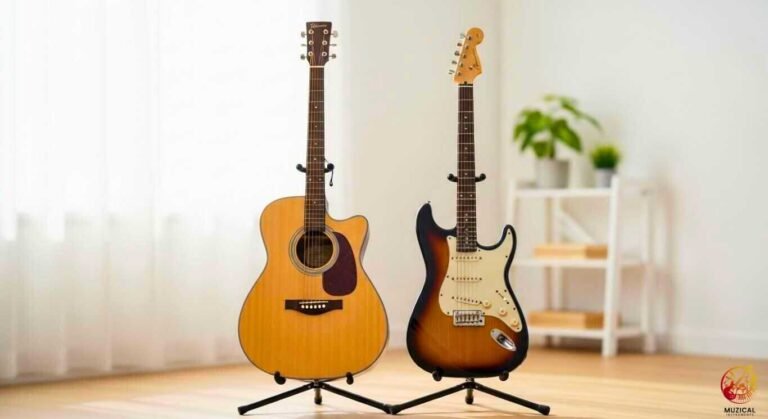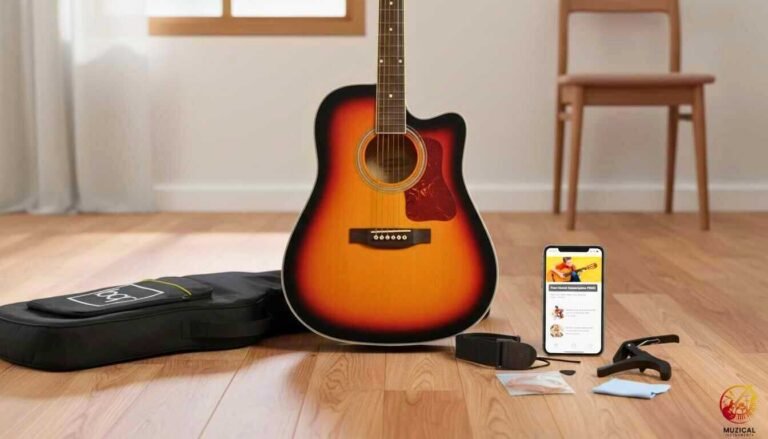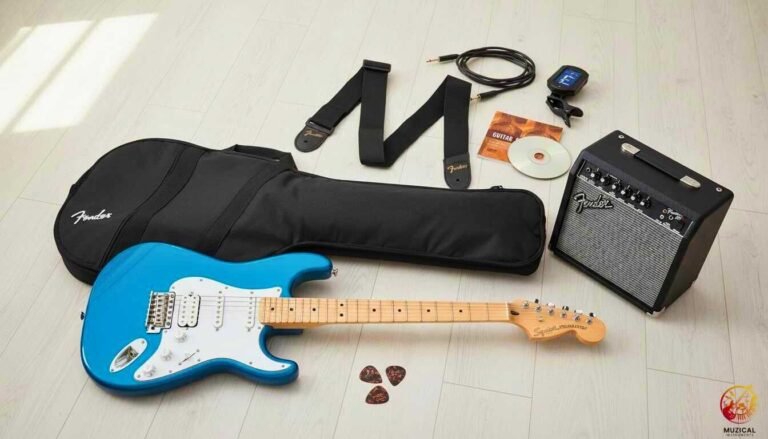Regular Guitar vs Foldable Guitar: Which One Truly Fits Your Lifestyle?
If you’re a guitarist who travels, you know how tricky it can be to bring your instrument along. This leads to a common debate for players: regular guitar vs foldable guitar, which is the better choice? Foldable guitars promise to make travel easier, but can they deliver the same great sound and feel as a standard guitar?
In this guide, you’ll get a side by side comparison of regular guitars and foldable guitars. We’ll look at how they differ in playability, durability, price, travel convenience, sound quality, and long term value.
You’ll also see where each one shines, where it falls short, and what real players are saying about the shift.
What Are the Real Differences Between Regular and Foldable Guitars?

The biggest difference in the regular guitar vs foldable guitar debate comes down to how they are built. While they might look alike with the same strings and general shape, their design is what truly sets them apart.
Construction and Design
A regular guitar is built as one solid, continuous piece. The neck and body are either glued (set neck), bolted, or cut from one block of wood. This gives it structural integrity. No moving parts mean fewer chances of anything going wrong.
Foldable guitars, on the other hand, feature a hinge or folding mechanism usually at the neck. That neck folds down into or alongside the body. Some use locking latches. Others have rotating pins or magnetic seals. These moving parts create small gaps that can slightly impact sustain or resonance.
Weight and Bulk
Foldable guitars are often lighter and more compact when collapsed. Some models shrink to the size of a backpack. That’s a massive advantage for airline travel, daily commuting, or minimal living setups.
Tonewoods and Hardware
High end foldables might still use solid woods, but cheaper ones often use carbon fiber or layered composites to keep the body stable despite folding. That can slightly color the tone often reducing the warmth or overtones you’d get from a full size mahogany or rosewood body.
Build Comparison
| Feature | Regular Guitar | Foldable Guitar |
|---|---|---|
| Neck Connection | Fixed (set-in or bolt-on) | Hinged or detachable |
| Portability | Bulky, needs case | Folds into compact form |
| Tonewood | Often solid tonewoods | Mix of composites and tonewoods |
| Assembly Time | Ready to play out of case | Requires unfolding and possible tuning |
| Durability Risk | Solid but prone to cracks if dropped | More resilient to climate, less fragile |
How Does Portability Affect Daily Use?
When it comes to convenience, the regular guitar vs foldable guitar debate has a clear winner. Anyone who travels knows that carrying a regular guitar can be a pain. It’s bulky, bumps into doorways, and needs a big, heavy case.
With a foldable guitar, that experience is turned upside down.
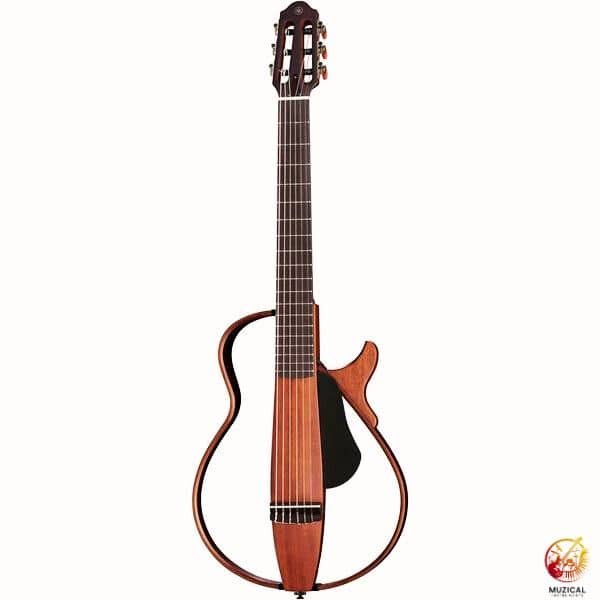
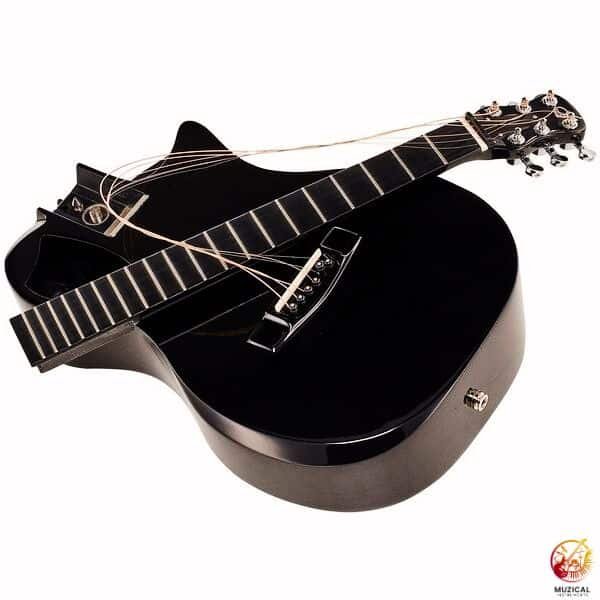
Air Travel and Carry on Compatibility
A folded travel guitar like the Journey Instruments OF660 or Yamaha SLG200 can fit in overhead compartments. No more gate checking or praying your gig bag survives baggage handlers.
Public Transport or Biking
Foldables make sense for urban commuters. Whether you’re on a subway or bicycle, a foldable guitar fits into a backpack sized case, keeping your hands free and your profile slim.
Home Storage
If you live in a studio apartment, van, or dorm, space is everything. A foldable guitar can be tucked behind a sofa, under a bed, or even stored upright in a closet.
Do Foldable Guitars Sound as Good as Regular Guitars?
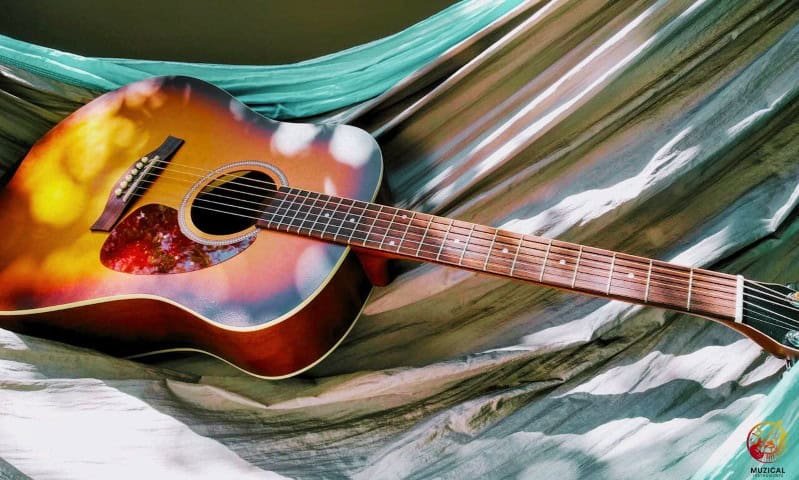
For many musicians, the most important part of the regular guitar vs foldable guitar debate comes down to one thing, sound. Does all that convenience come at the cost of good tone?
Let’s be clear for a massive professional concert, a player will likely choose a regular guitar. But for everyday playing, the sound difference might be smaller than you think.
Unplugged Sound
A regular acoustic guitar has a solid body that lets sound vibrations travel freely. This gives it a full, rich sound and allows notes to ring out for a long time.
Foldable guitars can sometimes struggle here. The hinge or moving parts can slightly weaken the vibrations, which can affect the tone. However, high quality foldable models, especially those made from materials like carbon fiber, are designed to overcome this and sound surprisingly close to a standard guitar.
Plugged In Performance
This is where foldable guitars really shine and can easily compete. Many travel guitars come with built in electronics, meaning you can plug them into an amplifier. Some even have headphone jacks for quiet practice or built in effects. When plugged in, they can sound just as good as a regular acoustic electric, especially in a loud environment like a coffee shop or small gig.
Pro Tip: If you usually play plugged into an amplifier, a foldable guitar with a good electronics system might sound nearly the same as a regular one. Sometimes, it can even sound better because it’s designed to reduce unwanted buzzing or feedback.
Which Guitar Type Holds Up Better Over Time?
When you’re deciding on a regular guitar vs foldable guitar, you want to pick one that will last. How long a guitar lasts depends on its materials and, more importantly, how you use it.
Climate and Weather Resistance
Regular wooden guitars can be sensitive to weather. Big changes in humidity, like you might find in a tropical climate, can cause the wood to swell, bend, or even crack over time. They often need special care to stay in good shape.
Foldable guitars, especially those made from carbon fiber, are much more durable in different weather conditions. They won’t get damaged if left in a hot car or taken on a cold camping trip. This makes them perfect for musicians who play outdoors or travel through areas with extreme temperatures.
Mechanical Parts and Repairs
On the other hand, the main weak spot for a foldable guitar is its hinge. Because it’s a moving part, the locking system can wear out or break. If that happens, you might need a special replacement part that isn’t easy to find.
Most guitar repair experts know how to fix a traditional guitar using standard tools. However, finding someone who can repair the unique folding mechanism of a travel guitar might be harder, especially if you aren’t in a major city.
Expert Insight: “Carbon fiber guitars are practically bulletproof in the field. But if the hinge goes? You’re stuck.”
How Do the Costs Compare: Initial Investment vs. Long Term Value?
When it comes to money, the regular guitar vs foldable guitar choice is about more than just the initial price tag. You have to consider the long term value.
| Guitar Type | Entry-Level Price | Mid-Range | High-End |
|---|---|---|---|
| Regular Guitar | $150–$400 | $500–$1,200 | $1,500+ |
| Foldable Guitar | $400–$800 | $900–$1,500 | $2,000+ (carbon fiber) |
At first glance, foldable guitars can seem expensive. However, their price often includes extras like a custom travel case and built in electronics for plugging into an amplifier. With a regular guitar, you would have to buy these accessories separately.
Extra Savings on Travel
This is where a foldable guitar can really save you money. You won’t need to buy a heavy, expensive flight case (which can cost over $150). You are also much less likely to be charged extra baggage fees by airlines. Over just a few trips, these savings can add up to a significant amount.
Value Over Time
It’s also smart to think about what the guitar will be worth if you decide to sell it later. Famous regular guitar brands like Martin or Taylor are known to hold their value very well over the years.
Some foldable guitars may lose their value more quickly, especially as their moving parts show wear. However, high end foldable models, like those made from durable carbon fiber, tend to hold their value much better.
Regular Guitar vs Foldable Guitar: Which One Is Right for You?
Choose a Regular Guitar If:
- You want the best sound quality possible
- You’re mostly playing at home or in studios
- You plan to resell or upgrade later
- You love traditional craftsmanship and tonewood warmth
Choose a Foldable Guitar If:
- You travel often or live in tight spaces
- You need to play in varying climates
- You’re prioritizing convenience over tradition
- You like the idea of tech add ons and portability
Personal Insight:
Some players actually use both. A full size at home. A foldable for gigs, road trips, or vacations. This hybrid strategy gives you the best of both worlds.
Final Thoughts: Is It Time to Fold or Stick With the Classic?
So, what’s the final word in the regular guitar vs foldable guitar debate? The truth is, both are great choices, but they are built for different types of players.
A regular guitar offers that classic, traditional sound. It’s the top choice for musicians who care most about getting the richest and fullest tone, especially for recording or performing.
A foldable guitar, on the other hand, is a modern solution for a practical problem. If you’re tired of the hassle of travel, dealing with airlines, or not having enough space at home, a foldable guitar is designed for you.
Ultimately, the best guitar is the one that fits your lifestyle.
If you are always on the move, a foldable guitar could be the smart, convenient tool you need. But if you are chasing the perfect sound above all else, nothing beats the feel of a classic acoustic guitar.
If you get the chance, try playing both.
Let your own hands and ears tell you which one is right for you.
If you’re leaning toward a foldable option, the Donner HUSH-X Pro travel-friendly electric guitar might be the sleek solution that fits right in your backpack.
FAQ: Regular Guitar vs Foldable Guitar
Q1. Do foldable guitars stay in tune after unfolding?
Most high quality foldable guitars are designed to hold tuning well, even after being folded and unfolded multiple times. Brands like Journey Instruments and Voyage Air use locking mechanisms that maintain string tension. That said, lower end models may require quick re tuning each time you set up. It’s best to check reviews before buying.
Q2. Can a foldable guitar replace a full size guitar?
In many cases, yes. Foldable guitars, especially carbon fiber or premium wood models can match regular guitars in tone and playability for most casual and even semi professional use. However, they may fall short in areas like resonance and sustain compared to high end traditional acoustics.
Q3. Do foldable guitars break easily?
Not usually. In fact, some foldable guitars especially those made with carbon fiber are tougher than wooden regular guitars. They resist temperature changes, humidity, and rough handling better. The only weak point is the hinge or locking mechanism, which needs proper care over time.
Q4. Are foldable guitars more expensive?
Foldable guitars tend to start at a higher price point than entry level regular guitars. This is because of the folding mechanism, materials, and travel friendly design. But when you factor in savings from travel cases and potential airline fees, the price often balances out.
Q5. Do foldable guitars come in electric versions?
Yes. While most foldable models are acoustic or acoustic electric, there are a few compact or detachable neck electric guitars on the market. These are popular among touring musicians who need a travel sized electric option without sacrificing tone or setup.
Q6. Can I record professionally with a foldable guitar?
Yes, especially if you use a model with a good built in pickup system or record it plugged in. Some carbon fiber foldables even have a clean, studio ready tone. That said, for purely acoustic studio recordings, a traditional full size guitar still offers more depth and natural warmth.


